2025年高考英语语法专题 课件 名词性从句
文档属性
| 名称 | 2025年高考英语语法专题 课件 名词性从句 |

|
|
| 格式 | pptx | ||
| 文件大小 | 252.9KB | ||
| 资源类型 | 试卷 | ||
| 版本资源 | 通用版 | ||
| 科目 | 英语 | ||
| 更新时间 | 2024-12-05 09:18:24 | ||
图片预览


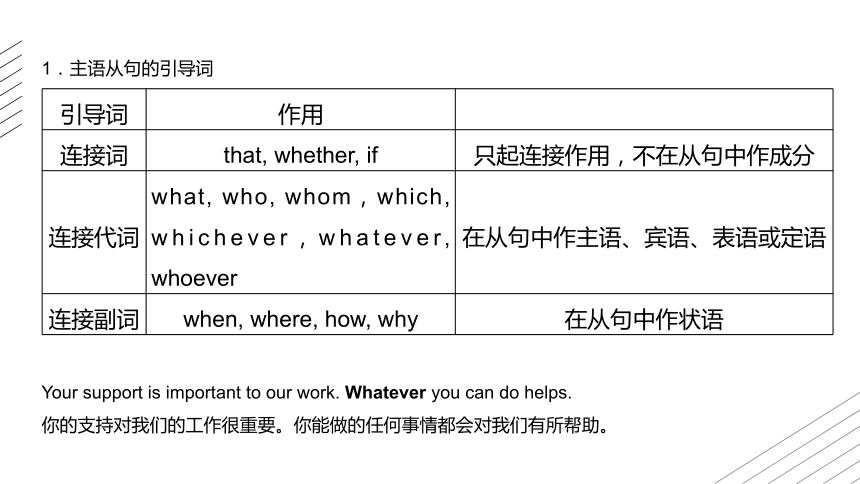
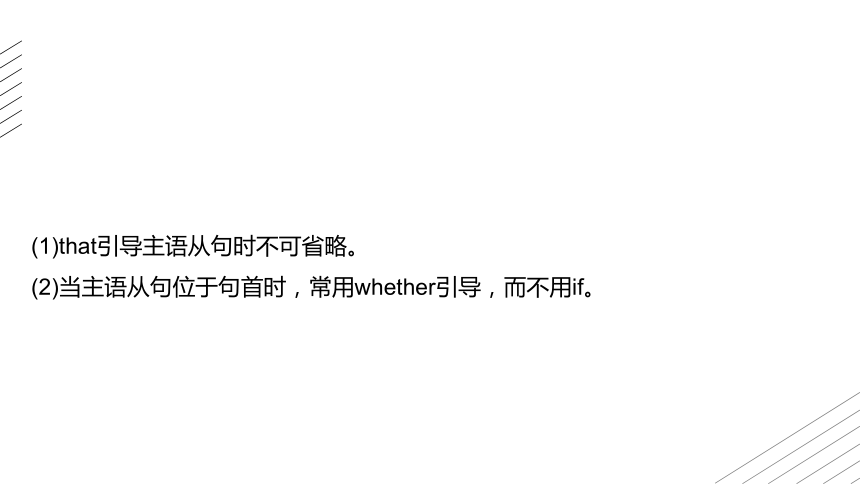
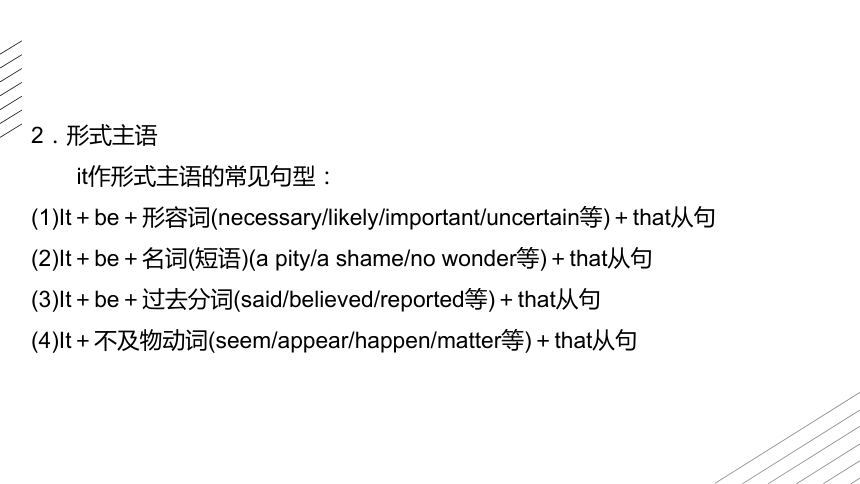
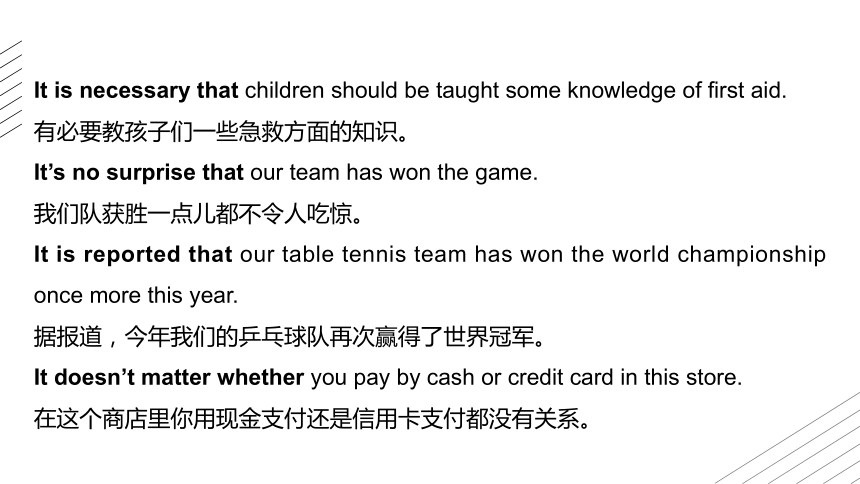
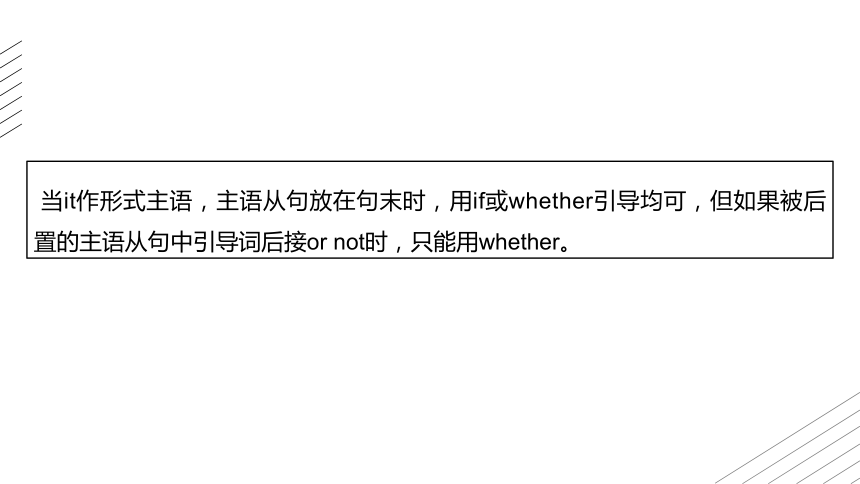
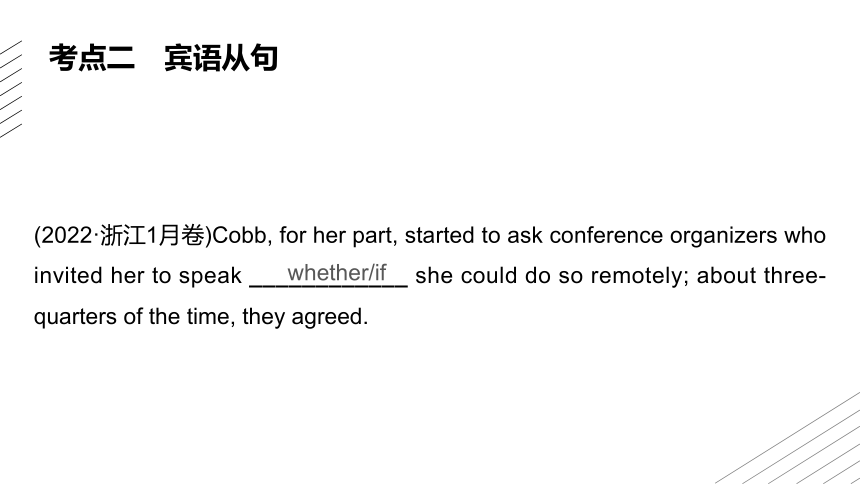
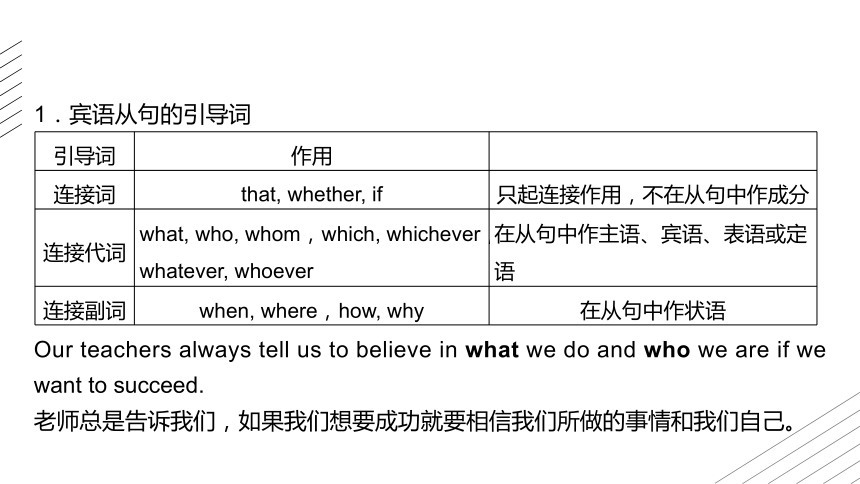
文档简介
(共24张PPT)
板块二 并列句、三大从句和特殊句式
名词性从句
2025年高考英语专题复习
(2021·新高考Ⅰ卷)Going to Mount Huangshan reminds me of the popular Beatles’ song “The Long and Winding Road”. _____ is so breathtaking about the experience is the out-of-this-world scenes.
What
考点一 主语从句
1.主语从句的引导词
Your support is important to our work. Whatever you can do helps.
你的支持对我们的工作很重要。你能做的任何事情都会对我们有所帮助。
引导词 作用
连接词 that, whether, if 只起连接作用,不在从句中作成分
连接代词 what, who, whom,which, whichever,whatever, whoever 在从句中作主语、宾语、表语或定语
连接副词 when, where, how, why 在从句中作状语
(1)that引导主语从句时不可省略。
(2)当主语从句位于句首时,常用whether引导,而不用if。
2.形式主语
it作形式主语的常见句型:
(1)It+be+形容词(necessary/likely/important/uncertain等)+that从句
(2)It+be+名词(短语)(a pity/a shame/no wonder等)+that从句
(3)It+be+过去分词(said/believed/reported等)+that从句
(4)It+不及物动词(seem/appear/happen/matter等)+that从句
It is necessary that children should be taught some knowledge of first aid.
有必要教孩子们一些急救方面的知识。
It’s no surprise that our team has won the game.
我们队获胜一点儿都不令人吃惊。
It is reported that our table tennis team has won the world championship once more this year.
据报道,今年我们的乒乓球队再次赢得了世界冠军。
It doesn’t matter whether you pay by cash or credit card in this store.
在这个商店里你用现金支付还是信用卡支付都没有关系。
当it作形式主语,主语从句放在句末时,用if或whether引导均可,但如果被后置的主语从句中引导词后接or not时,只能用whether。
(2022·浙江1月卷)Cobb, for her part, started to ask conference organizers who invited her to speak ____________ she could do so remotely; about three-quarters of the time, they agreed.
whether/if
考点二 宾语从句
1.宾语从句的引导词
Our teachers always tell us to believe in what we do and who we are if we want to succeed.
老师总是告诉我们,如果我们想要成功就要相信我们所做的事情和我们自己。
引导词 作用
连接词 that, whether, if 只起连接作用,不在从句中作成分
连接代词 what, who, whom,which, whichever,whatever, whoever 在从句中作主语、宾语、表语或定语
连接副词 when, where,how, why 在从句中作状语
(1)that引导宾语从句时,常被省略,但下列情况下不能省略:①动词后跟有多个that引导的宾语从句时,只有第一个that可省略,其余的不可省略;②宾语从句前有插入语时;③that引导的从句位于句首时。
(2)一般情况下介词后只能用wh-类连接词引导宾语从句。介词后的宾语从句,连接词表示“是否”时,只能用whether,不能用if。
2.形式宾语
宾语一般放在及物动词或介词之后,但是,在下列情况下,须用it作形式宾语,而将真正的宾语(常为不定式或从句)后置。
(1)动词find/feel/think/consider/make+it+宾语补足语(形容词或名词)+不定式/从句
(2)动词hate/like/dislike/appreciate/enjoy+it+从句
(3)短语动词see to/depend on/rely on+it+从句
(4)固定搭配take it for granted that/owe it to sb. that+从句
No matter where he is, he makes it a rule to go for a walk before breakfast.
无论他在哪里,他都习惯在早餐前散步。
3.宾语从句的时态
一般情况下,宾语从句须与主句的时态保持一致,即主句是一般现在时,从句可根据具体情况选用合适的时态;主句为过去的某种时态,从句须用相应的过去的某种时态;当从句的内容为真理或客观事实时,须用一般现在时。
考点三 表语从句
(2023·新课标Ⅱ卷)They also need to be ready to give interviews in English with international journalists. This is _____ they need an English trainer.
why
引导词 作用
连接词 that, whether 只起连接作用,不在从句中作成分
连接代词 what, who, whom,which, whichever,whatever, whoever 在从句中作主语、宾语、表语或定语
连接副词 when, where,how, why 在从句中作状语
1.表语从句的引导词
The most important for the user is that the product does what is intended.
对用户来说,最重要的是产品达到了预期的效果。
if不能引导表语从句;that引导表语从句时一般不能省略。
2.as if/as though引导表语从句
as if/as though意为“好像,仿佛”,引导的表语从句常跟在系动词(be, seem, appear, look, taste, sound, feel, smell等)之后。若表语从句所述的是非真实的情况,从句用虚拟语气;若所述的是事实或是极有可能发生的情况,从句用陈述语气。
The thick smog covered the whole city. It was as if a great blanket had been thrown over it.
浓雾笼罩着整个城市,这就好像一块巨大的毯子把它裹住了一样。
3.其他常考的表语从句
(1)This/That/It is why+表语从句(表示结果)“这/那就是……的原因”,why后接结果。
(2)This/That/It is because+表语从句(表示原因)“这/那是因为……”,because后接原因。
(3)The reason why... is that+表语从句“……的原因是……”。
同位语从句在句中作某一名词的同位语,位于该名词之后,用来说明该名词的具体内容。同位语从句所修饰的名词:advice, conclusion, doubt, fact, hope, idea, news, promise, question, suggestion, thought, truth, wish, word, assumption等。同位语从句的引导词:that, whether, how, where, when, why等。
No one can deny the fact that studying abroad has lots of advantages.
没人能否认出国留学有很多优势这个事实。
考点四 同位语从句
that引导同位语从句和定语从句的区别:that引导定语从句时,that既起引导词的作用,又在从句中充当句子成分;如果在从句中作宾语,that还可以省略,所修饰的名词指物时可用which替换。引导同位语从句时,that在从句中不充当任何句子成分,不能省略。
The news that they had won the game soon spread over the whole school.
他们比赛获胜的消息很快传遍了整个学校。(同位语从句)
The news that you told me yesterday was really inspiring.
你昨天告诉我的消息实在鼓舞人心。(定语从句)
1.that和what的区别
that引导名词性从句时,在主从句中不充当任何句子成分,也没有任何含义;而what引导名词性从句时,在主从句中都要充当一定的句子成分,what可以分解成定语从句中的“先行词+关系代词”,即常说的“先行词+that/which/who”。
It’s a shame that he has made such a mistake.
真遗憾,他犯了这样一个错误。
I will do what I can (do) to help him.
我将尽我所能帮助他。
考点五 名词性从句重点辨析
2.同位语从句与定语从句的区别
判断是定语从句还是同位语从句可以用“加词”的方法,即在名词和从句之间加入一个be动词,如果句子意思成立,则是同位语从句,否则,则是定语从句。试比较:
①The notice that the meeting had to be put off was true. (同位语从句)
→The notice was that the meeting had to be put off.
②The notice that he read just now was true. (定语从句)
3.whether与if引导的名词性从句
(1)whether引导的主语从句既可以放在句首也可以放在句末,但if引导的主语从句只能放在句末,且前面需用it作形式主语。
Whether it is true remains a question.
这是否是真的依然是个问题。
It is unknown if he will attend the meeting.
他是否会来参加会议还不清楚。
(2)whether与if引导宾语从句时,大多数情况下可以互换,后面直接跟or not时用whether,用于介词后引导宾语从句时也用whether。
We don’t know whether or not she was ready.
我们不知道她是否准备好了。
I’m interested in whether you’ve finished the work.
我对你是否完成了这项工作感兴趣。
(3)whether可引导表语从句和同位语从句,而if不可以引导这两种从句。
The question is whether it is worth doing.
问题是它是否值得去做。
The question whether the work was worth doing has not been decided.
这项工作值不值得做的问题还没有确定。
THANKS
板块二 并列句、三大从句和特殊句式
名词性从句
2025年高考英语专题复习
(2021·新高考Ⅰ卷)Going to Mount Huangshan reminds me of the popular Beatles’ song “The Long and Winding Road”. _____ is so breathtaking about the experience is the out-of-this-world scenes.
What
考点一 主语从句
1.主语从句的引导词
Your support is important to our work. Whatever you can do helps.
你的支持对我们的工作很重要。你能做的任何事情都会对我们有所帮助。
引导词 作用
连接词 that, whether, if 只起连接作用,不在从句中作成分
连接代词 what, who, whom,which, whichever,whatever, whoever 在从句中作主语、宾语、表语或定语
连接副词 when, where, how, why 在从句中作状语
(1)that引导主语从句时不可省略。
(2)当主语从句位于句首时,常用whether引导,而不用if。
2.形式主语
it作形式主语的常见句型:
(1)It+be+形容词(necessary/likely/important/uncertain等)+that从句
(2)It+be+名词(短语)(a pity/a shame/no wonder等)+that从句
(3)It+be+过去分词(said/believed/reported等)+that从句
(4)It+不及物动词(seem/appear/happen/matter等)+that从句
It is necessary that children should be taught some knowledge of first aid.
有必要教孩子们一些急救方面的知识。
It’s no surprise that our team has won the game.
我们队获胜一点儿都不令人吃惊。
It is reported that our table tennis team has won the world championship once more this year.
据报道,今年我们的乒乓球队再次赢得了世界冠军。
It doesn’t matter whether you pay by cash or credit card in this store.
在这个商店里你用现金支付还是信用卡支付都没有关系。
当it作形式主语,主语从句放在句末时,用if或whether引导均可,但如果被后置的主语从句中引导词后接or not时,只能用whether。
(2022·浙江1月卷)Cobb, for her part, started to ask conference organizers who invited her to speak ____________ she could do so remotely; about three-quarters of the time, they agreed.
whether/if
考点二 宾语从句
1.宾语从句的引导词
Our teachers always tell us to believe in what we do and who we are if we want to succeed.
老师总是告诉我们,如果我们想要成功就要相信我们所做的事情和我们自己。
引导词 作用
连接词 that, whether, if 只起连接作用,不在从句中作成分
连接代词 what, who, whom,which, whichever,whatever, whoever 在从句中作主语、宾语、表语或定语
连接副词 when, where,how, why 在从句中作状语
(1)that引导宾语从句时,常被省略,但下列情况下不能省略:①动词后跟有多个that引导的宾语从句时,只有第一个that可省略,其余的不可省略;②宾语从句前有插入语时;③that引导的从句位于句首时。
(2)一般情况下介词后只能用wh-类连接词引导宾语从句。介词后的宾语从句,连接词表示“是否”时,只能用whether,不能用if。
2.形式宾语
宾语一般放在及物动词或介词之后,但是,在下列情况下,须用it作形式宾语,而将真正的宾语(常为不定式或从句)后置。
(1)动词find/feel/think/consider/make+it+宾语补足语(形容词或名词)+不定式/从句
(2)动词hate/like/dislike/appreciate/enjoy+it+从句
(3)短语动词see to/depend on/rely on+it+从句
(4)固定搭配take it for granted that/owe it to sb. that+从句
No matter where he is, he makes it a rule to go for a walk before breakfast.
无论他在哪里,他都习惯在早餐前散步。
3.宾语从句的时态
一般情况下,宾语从句须与主句的时态保持一致,即主句是一般现在时,从句可根据具体情况选用合适的时态;主句为过去的某种时态,从句须用相应的过去的某种时态;当从句的内容为真理或客观事实时,须用一般现在时。
考点三 表语从句
(2023·新课标Ⅱ卷)They also need to be ready to give interviews in English with international journalists. This is _____ they need an English trainer.
why
引导词 作用
连接词 that, whether 只起连接作用,不在从句中作成分
连接代词 what, who, whom,which, whichever,whatever, whoever 在从句中作主语、宾语、表语或定语
连接副词 when, where,how, why 在从句中作状语
1.表语从句的引导词
The most important for the user is that the product does what is intended.
对用户来说,最重要的是产品达到了预期的效果。
if不能引导表语从句;that引导表语从句时一般不能省略。
2.as if/as though引导表语从句
as if/as though意为“好像,仿佛”,引导的表语从句常跟在系动词(be, seem, appear, look, taste, sound, feel, smell等)之后。若表语从句所述的是非真实的情况,从句用虚拟语气;若所述的是事实或是极有可能发生的情况,从句用陈述语气。
The thick smog covered the whole city. It was as if a great blanket had been thrown over it.
浓雾笼罩着整个城市,这就好像一块巨大的毯子把它裹住了一样。
3.其他常考的表语从句
(1)This/That/It is why+表语从句(表示结果)“这/那就是……的原因”,why后接结果。
(2)This/That/It is because+表语从句(表示原因)“这/那是因为……”,because后接原因。
(3)The reason why... is that+表语从句“……的原因是……”。
同位语从句在句中作某一名词的同位语,位于该名词之后,用来说明该名词的具体内容。同位语从句所修饰的名词:advice, conclusion, doubt, fact, hope, idea, news, promise, question, suggestion, thought, truth, wish, word, assumption等。同位语从句的引导词:that, whether, how, where, when, why等。
No one can deny the fact that studying abroad has lots of advantages.
没人能否认出国留学有很多优势这个事实。
考点四 同位语从句
that引导同位语从句和定语从句的区别:that引导定语从句时,that既起引导词的作用,又在从句中充当句子成分;如果在从句中作宾语,that还可以省略,所修饰的名词指物时可用which替换。引导同位语从句时,that在从句中不充当任何句子成分,不能省略。
The news that they had won the game soon spread over the whole school.
他们比赛获胜的消息很快传遍了整个学校。(同位语从句)
The news that you told me yesterday was really inspiring.
你昨天告诉我的消息实在鼓舞人心。(定语从句)
1.that和what的区别
that引导名词性从句时,在主从句中不充当任何句子成分,也没有任何含义;而what引导名词性从句时,在主从句中都要充当一定的句子成分,what可以分解成定语从句中的“先行词+关系代词”,即常说的“先行词+that/which/who”。
It’s a shame that he has made such a mistake.
真遗憾,他犯了这样一个错误。
I will do what I can (do) to help him.
我将尽我所能帮助他。
考点五 名词性从句重点辨析
2.同位语从句与定语从句的区别
判断是定语从句还是同位语从句可以用“加词”的方法,即在名词和从句之间加入一个be动词,如果句子意思成立,则是同位语从句,否则,则是定语从句。试比较:
①The notice that the meeting had to be put off was true. (同位语从句)
→The notice was that the meeting had to be put off.
②The notice that he read just now was true. (定语从句)
3.whether与if引导的名词性从句
(1)whether引导的主语从句既可以放在句首也可以放在句末,但if引导的主语从句只能放在句末,且前面需用it作形式主语。
Whether it is true remains a question.
这是否是真的依然是个问题。
It is unknown if he will attend the meeting.
他是否会来参加会议还不清楚。
(2)whether与if引导宾语从句时,大多数情况下可以互换,后面直接跟or not时用whether,用于介词后引导宾语从句时也用whether。
We don’t know whether or not she was ready.
我们不知道她是否准备好了。
I’m interested in whether you’ve finished the work.
我对你是否完成了这项工作感兴趣。
(3)whether可引导表语从句和同位语从句,而if不可以引导这两种从句。
The question is whether it is worth doing.
问题是它是否值得去做。
The question whether the work was worth doing has not been decided.
这项工作值不值得做的问题还没有确定。
THANKS
